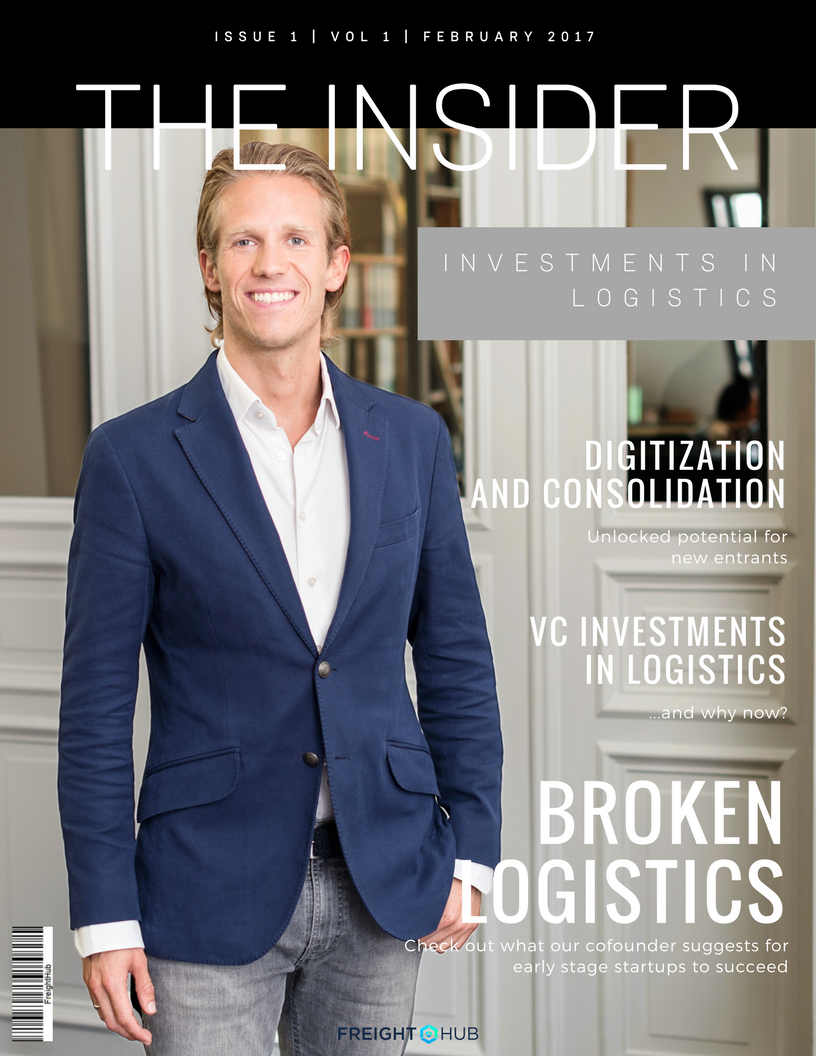VC Investments in Logistics Expected to Continue in 2017
As the global environment rapidly changes, supply chains too are changing to reflect rising risks and shifts in demand. Thanks to technology, new companies are entering the space changing the traditional ways we manage and think of fulfillment, delivery, transportation and more.
CEO and Co-Founder of FreightHub, the digital freight forwarder, Ferry Heilemann, is a noted entrepreneur who has been actively involved within venture capital firm, Earlybird, supporting companies in the digital sector. We chatted with Ferry about his thoughts on investors’ interest in supply chain.
There is a good bit of financial investment being made in logistics. How much is going into the sector?
Ferry: CB Insights recently published a study indicating that since 2012, over 8 billion USD has been invested in the logistics space across almost 940 deals. In 2016 close to 6 billion USD is forecasted to be invested in 315 deals.

Why are venture capitalists focusing on/investing in logistics and shipping and why now?
Ferry: The Logistics market overall is one of the biggest industries and is making the world go round – without logistics we would both be sitting here naked!
Most business models in the logistics industry are managed in an old fashioned way and have a very low degree of digitization, like freight forwarding. Many areas of logistics are fragmented and offline which leaves a lot of room for digitization and consolidation and therefore a lot of potential for new entrants that are bringing in a totally new perspective.
What do Venture Capitalists see as “broken” in logistics and shipping? What Problems should innovations like online marketplaces and digital forwarders solve?
Ferry: The logistics Industry is partially broken because it is very analog / offline, therefore wasting time, money, other resources and on top of everything providing a poor service. In addition, pricing is often not transparent for the customer all of which is not suitable for the 21st century. Digital new entrants need to increase transparency, speed, usability and therefore significantly improve the service for the customer. In addition to that they need to reduce costs, get more value out of less resources and waste less energy.
From an investment view, how do you and venture capitalists view the logistics & shipping markets? High risk/high profit or low risk/low profit or somewhere in the middle?
Ferry: The Market is complex and there are not many people from the digital scene who are willing or able to tackle the really big and complex topics such as freight forwarding. Generally speaking, the margins are low at the moment and the pressure on all players is high.
The carrier market is a very personal contact driven business and consolidation will continue in 2017 – therefore it will be difficult to enter the market without access to the market makers.
At the same time the market setting is good for disruption and the industry will always continue to exist – goods will also be moved in 50 years.
Freight Forwarding is often described as a relationship business. How do you expect digital freight forwarders and online marketplaces to live up to it or change it?
Ferry: Digital players will certainly bring more cost transparency into the market which is favorable for the customers but will be objected by the existing players. Transparency will certainly reduce the dependency on personal contacts, but it will be a process that evolves over years if not decades. I do not expect a sudden change in the industry.
What is your advice for early stage startups to succeed?
Ferry: First, select the market you want to enter very carefully: Are there very strong players, is it possible to gain momentum as a new entrant, is it a red or a blue ocean?
Second, compile a best in class complimentary team that can cover all of the needed expertise for your business idea.
Then, start talking to investors at a very early stage to find out if your idea will be fundable or if the market is willing to invest. Learn / work with other startups before starting your own, build your network, find out how startups work by learning from serial entrepreneurs in a high paced environment instead of making all the mistakes yourself again and increasing your risk to fail.
Finally, be extremely persistent and work hard but also be reflective at the same time to lead and guide your company to success!
We thank Ferry for taking time to share his thoughts on the market. To sum up, investments are being made in the supply chain market to provide efficiency, transparency, speed and more. More investments are expected this year as supply chains work to become more agile and adaptable for today’s environment.
Click to take control of your supply chain: http://buff.ly/2lJOHvY








